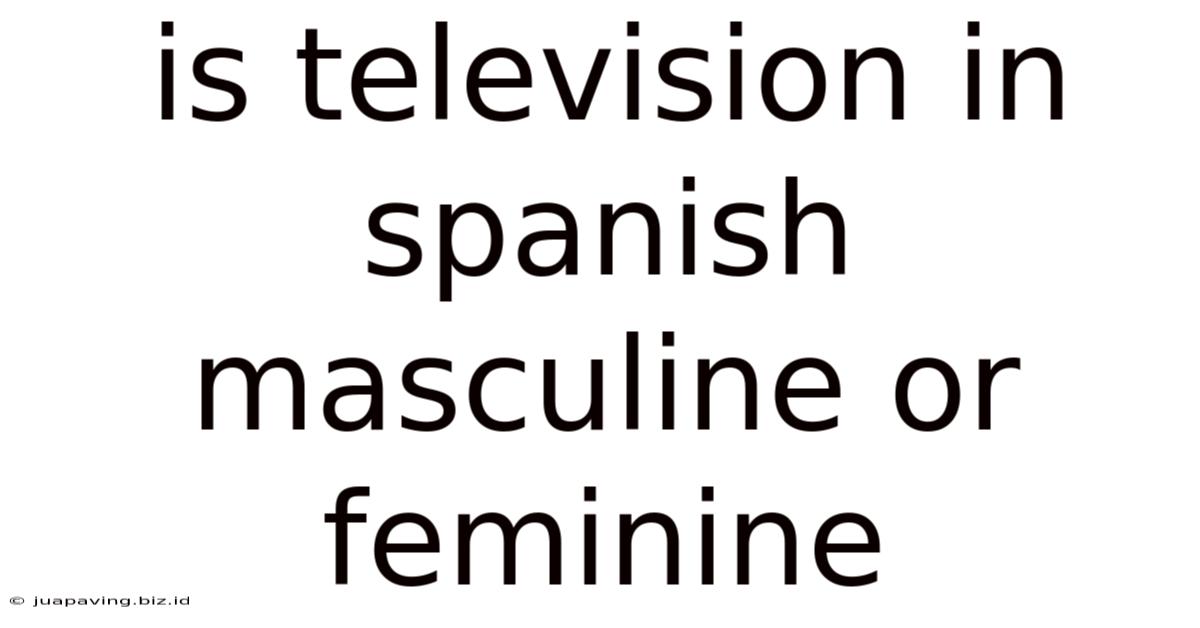Is Television In Spanish Masculine Or Feminine
Juapaving
May 30, 2025 · 4 min read

Table of Contents
Is Television in Spanish Masculine or Feminine? A Deep Dive into Gendered Nouns
The seemingly simple question of whether "television" is masculine or feminine in Spanish can actually unlock a deeper understanding of the language's grammatical intricacies. While seemingly arbitrary to native English speakers, the gender assignment of nouns in Spanish is a fundamental aspect of the language's structure, impacting everything from adjective agreement to pronoun usage. This article will delve into the gender of "televisión," exploring the rules (and exceptions!) that govern noun gender in Spanish and offering practical examples to solidify your understanding.
Understanding Grammatical Gender in Spanish
Unlike English, which largely relies on natural gender (referring to the sex of a noun), Spanish uses grammatical gender. This means that nouns are assigned either masculine (masculino) or feminine (femenino) regardless of their inherent biological sex. This grammatical gender then dictates the agreement of articles (the, a, an), adjectives, and pronouns that accompany the noun.
Think of it like this: "el perro" (the dog) uses the masculine definite article "el," while "la gata" (the cat) uses the feminine definite article "la." The gender of the noun dictates the form of the article, and any accompanying adjectives will also need to agree in gender.
Is "Televisión" Masculine or Feminine?
The answer is: "Televisión" is feminine. This means it uses feminine articles ("la," "una") and feminine adjectives.
Why is "Televisión" Feminine?
There's no single, easily definable rule to explain why televisión is feminine. Many Spanish nouns, especially those borrowed from other languages, defy simple categorization. While there are patterns and tendencies, ultimately, memorization and exposure are key to mastering noun gender in Spanish.
The feminine gender assignment of televisión is simply a fact of the language, just as mesa (table) is feminine and libro (book) is masculine.
Mastering Noun Gender: Tips and Tricks
While there are no hard and fast rules covering every single noun, here are some helpful guidelines and strategies for determining the gender of Spanish nouns:
1. Common Gender Endings:
While not foolproof, some common noun endings tend to correlate with particular genders:
- Masculine Endings: Nouns ending in "-o" are generally masculine (e.g., libro, gato, carro).
- Feminine Endings: Nouns ending in "-a" are generally feminine (e.g., casa, mesa, gata).
However, these are not absolute rules! Many exceptions exist.
2. Nouns Ending in Consonants:
Nouns ending in consonants are notoriously unpredictable. Their gender must be memorized. Some examples include:
- Masculine: el coche (car), el reloj (clock), el árbol (tree)
- Feminine: la mano (hand), la luz (light), la mujer (woman)
3. Learning Through Context:
Pay attention to the articles and adjectives used with the noun. If you see "la televisión," you know it's feminine. Repeated exposure to nouns in context is crucial for memorization.
4. Utilizing Dictionaries and Resources:
Always consult a Spanish-English dictionary. Reputable dictionaries will clearly indicate the gender of each noun. Many online dictionaries even provide audio pronunciations, enhancing your learning experience.
5. Immersion and Practice:
The best way to master noun gender is through immersion. Read Spanish books, watch Spanish-language television (ironic, isn't it?), listen to Spanish music, and engage in conversations with native speakers.
Using "Televisión" Correctly in a Sentence
Let's see how to use "televisión" correctly in sentences, demonstrating its feminine gender:
- La televisión está rota. (The television is broken.) Note the use of the feminine definite article "la."
- Quiero comprar una televisión nueva. (I want to buy a new television.) Here, we use the feminine indefinite article "una."
- Mi televisión es muy grande. (My television is very big.) The adjective "grande" agrees in gender with "televisión," taking the feminine form.
- Vi una película interesante en la televisión anoche. (I saw an interesting movie on television last night.) Again, the feminine article "la" is used.
Advanced Considerations: Gendered Nouns and Their Nuances
The grammatical gender of nouns extends beyond simple agreement; it often influences the overall meaning and tone of a sentence. Understanding these nuances is key to advanced Spanish proficiency.
-
Gender and Meaning: While grammatical gender is often arbitrary, sometimes it reflects aspects of the noun's meaning. Consider the difference between el cura (priest, masculine) and la monja (nun, feminine). The gender reflects the biological sex of the individuals being described.
-
Gender and Figurative Language: Metaphorical use of gendered nouns can significantly influence the tone and implications of a sentence.
-
Gender and Regional Variations: While the core rules of gender agreement remain consistent, subtle regional variations in pronunciation and usage can exist.
Conclusion: Embrace the Challenge of Noun Gender
Mastering noun gender in Spanish can be challenging, but it’s a fundamental step towards fluency. By understanding the system, utilizing effective learning strategies, and immersing yourself in the language, you'll gradually internalize the gender of nouns like televisión and confidently navigate the complexities of Spanish grammar. Remember, practice makes perfect! Consistent exposure and active engagement are your best allies in conquering this aspect of the Spanish language. The more you interact with the language, the more natural gender agreement will become. So, grab a Spanish dictionary, engage with the language, and enjoy the journey of mastering this fascinating element of Spanish grammar. ¡Buena suerte! (Good luck!)
Latest Posts
Latest Posts
-
A Consumer With Only Part A Residing
May 31, 2025
-
What Are 6 Characteristics Of Civilization
May 31, 2025
-
A Defense Of Abortion Judith Jarvis Thomson Summary
May 31, 2025
-
Cici Firmly Believes That Every Child
May 31, 2025
-
Classical Conditioning Ucs Ucr Cs Cr
May 31, 2025
Related Post
Thank you for visiting our website which covers about Is Television In Spanish Masculine Or Feminine . We hope the information provided has been useful to you. Feel free to contact us if you have any questions or need further assistance. See you next time and don't miss to bookmark.